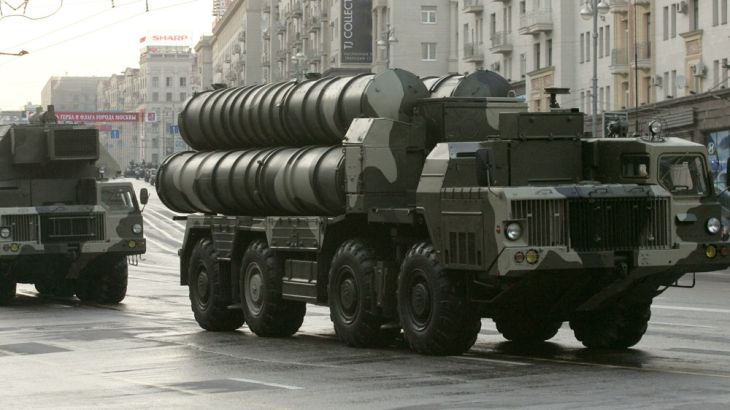Russian decision to deploy S-300 in Syria ‘a major mistake’: US
US National Security Advisor says sending S-300 missile system to Syria would be considered a ‘significant escalation’.

The United States says the Russia decision to supply Syria with an advanced air defence missile system is a “major mistake”.
Moscow said on Monday it will bolster Syria’s air defence following the downing of a Russian plane last week by sending a modern S-300 system to the Syrian army within two weeks.
“We think introducing the S-300s to the Syrian government would be a significant escalation by the Russians and something that we hope, if these press reports are accurate, they would reconsider,” US National Security Advisor, John Bolton, said on Monday.
“We have American forces in the area we’re concerned about,” Bolton said.
“The Israelis have a legitimate right to self-defence against this Iranian aggressive behavior, and what we’re all trying to do is reduce tensions, reduce the possibility of major new hostilities. That’s why the president has spoken to this issue and why we would regard introducing the S-300 as a major mistake.” he added.
In a televised statement on Monday, Russia’s Defence Minister Sergei Shoigu said the decision to “transfer the missile defence system to the Syrian armed forces “was taken by President Vladimir Putin and is one of the “response measures”.
On the same day, the Kremlin accused Israeli pilots of “premeditated actions” over the downing of a Russian plane in Syria last week, warning it will harm relations between the two countries.
“According to information of our military experts, the reason (behind the downing) were premeditated actions by Israeli pilots which certainly cannot but harm our relations,” Kremlin spokesman Dmitry Peskov told journalists.
‘Change the situation dramatically’
However, the Kremlin said the installation of S-300 was aimed at increasing safety of Russian military and “not directed at any third country”.
Russia will also block navigation and satellite systems, as well as communications of warplanes operating in the eastern Mediterranean, according to the defence minister.
Moscow has blamed Israel for the accidental shooting down of the aircraft with 15 people onboard. The Israeli military, however, said that Syria’s indiscriminate air defence fire was the cause of the plane crash.
Al Jazeera’s Rory Challands, reporting from Moscow, said the announcement on missiles seemed to be linked to the incident with Israel.
“The S-300 was a deal that had been signed with Syria in 2013, but Israel put its foot down on negotiation with Russia and Russia decided that it was going to hold off delivering these units,” he said.
“In the aftermath of the events last week in which a Russian plane was shot down in the area over the Syrian coast, Russia has obviously decided to go against that agreement with Israel.”
Elias Farhat, a military analyst and retired Lebanese army general, said the Syrians have already been trained on how to operate the S-300 a few years ago.
“There have been leaks that Syrian officers went to Russia in order to train on the usage [of the missile system],” he told Al Jazeera from the Lebanese capital, Beirut.
“The S-300 is a very effective anti-aircraft missile … Israel is aware of that,” Farhat said.
“So that will change the situation dramatically, and there will be no more freedom of movement for the Israeli air force in the Syrian airspace.”
Friendly fire
Monday’s incident highlighted the dangers posed by the conflicting interests of various powers in the crowded skies over war-torn Syria and threatened to damage relations between Russia and Israel.
The incident was also the worst case of friendly fire between Russia and Syria since Moscow’s military intervention in the country in support of President Bashar al-Assad‘s forces in September 2015.
Since intervening in Syria’s war, Russia has generally turned a blind eye to Israeli attacks inside the country.
Israel has carried out about 200 air raids in the last two years, according to Israeli officials.
For several years, Israel and Russia have maintained a special hotline to prevent their air forces from clashing in the skies over Syria. Israeli military officials have previously praised its effectiveness.
A dispute between Israel and Russia could restrict Israel’s ability to mount air raids inside Syria on what it considers the greatest threat to its security from the Syria conflict: the build-up of Iranian forces or Iranian-backed Hezbollah fighters.